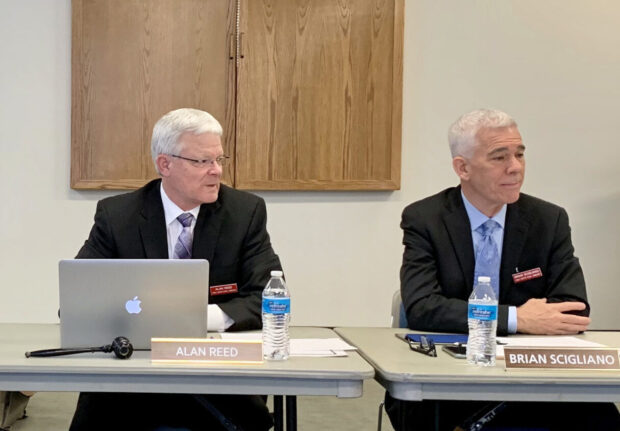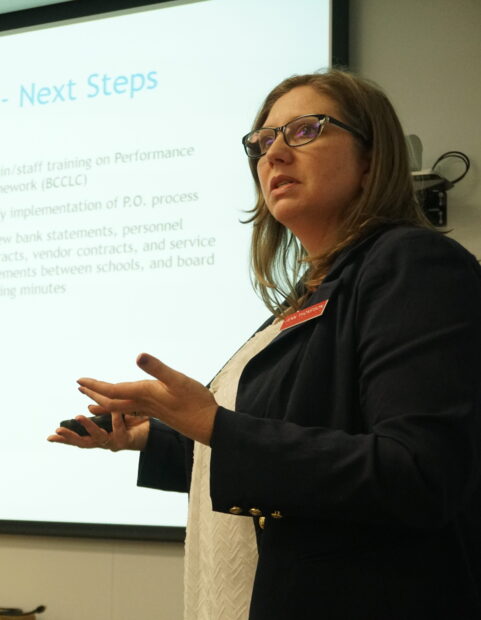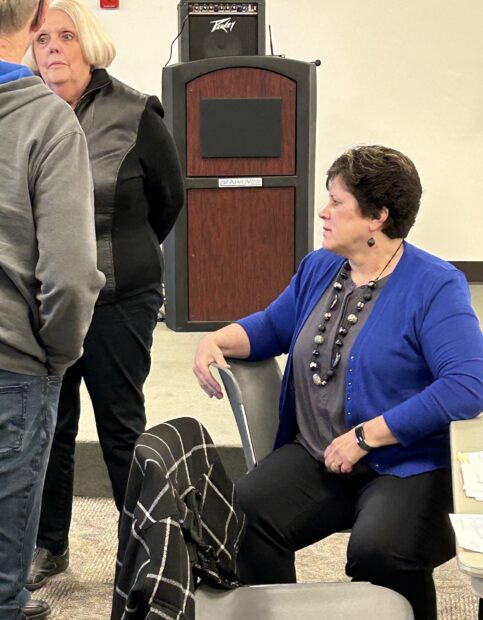Two key members of the Idaho Public Charter Commission organization stepped down this week because they believe the commission is not acting responsibly to taxpayers and state lawmakers.
The seven-member commission is a single-purpose entity that ensures the interests and needs are being met for 29,000 students who attend 71 charter schools throughout Idaho. Commissioners rely on the analysis and recommendations of its staff to monitor financial health, academic performance and regulatory compliance for those schools.
The commission accepted director Jenn Thompson’s resignation Wednesday evening after a 20-minute closed-door executive session, and it also received a resignation email Tuesday from commissioner Brian Scigliano, who serves as the finance chair.
“The commission decided to allow an essentially for-profit school to operate using a financial framework that is in conflict with state statute and taxpayer interests,” Scigliano wrote in an email to commission chairman Alan Reed.

“What was so discouraging was that several commissioners expressed confusion regarding Idaho Virtual Academy’s fee structure but chose to rely on the school’s claims rather than our staff’s evaluation,” Scigliano wrote. He believes this decision will lead to more exemptions.
Last month, the commission voted to continue exempting IDVA from a financial accounting practice that helps commissioners evaluate each school’s financial health. IDVA convinced them that the structure of the school’s financial statements do not align with the commission’s metrics so the exemption was warranted.
Scigliano also disagreed with the commission’s Peace Valley Charter School renewal, because that decision failed to “protect taxpayer and student interests” by approving a school with chronic, repeated violations, as well as a consistently “dysfunctional board.”
In her resignation letter, Thompson says she is “struggling to uphold” the commission’s decision because its IDVA decision does not align with state statute.

Charter school authorizers are required to evaluate financial audit reports and use that evaluation to inform their renewal decisions, Thompson wrote.
“In this case, by voting to not evaluate a school’s financial audit reports at all, I believe that the commission has voted to act contrary to statute,” she wrote.
And that decision renders Thompson’s staff unable to perform its statutory duty.
“The practices at this school clearly do not support taxpayer interests, and I’m struggling with the inconsistency of our approach to authorizing. My decision to move on is not just about one single decision, but the overall direction of the authorizing body,” Thompson wrote.
Reed praised both Thompson and Scigliano for their hard work, “but that’s Brian’s choice. It’s hard to see him leave.”
Thompson has “left some big shoes to fill,” he said.
Regarding the commission’s IDVA and Peace Valley renewals, Reed said the commission as a whole makes the decision and “it’s not going to be exactly what each person wanted every time.”
The House Education Committee voted to “approve what’s going on here with their finances,” Reed said. “I think that shows this is in order.”
House Bill 113 was approved Tuesday at the Statehouse. It clarifies that contracts between third-party vendors like K12 and charters should be considered favorably if they result in the vendor forgiving a charter’s debt if the charter is unable to pay it back.
Reed said he’s spoken to Gov. Brad Little about Scigliano’s resignation, “and they are working on it to come up with another commission member.”
Melissa-Jo Rivera was named interim director during the search for a new director. Thompson’s last day is March 31. Before becoming director, Thompson was a charter school teacher, principal, and board member. She is certificated as an administrator and secondary teacher in Idaho.
Monticello Montessori Charter School
On Wednesday, the commission voted 4-1 to renew Monticello charter’s contract for another five years with seven conditions. Commissioner Karen Echeverria stood in opposition.
Commissioners Nils Peterson, Sherrilynn Bair, Dean Fisher and Wanda Quinn voted in favor of the renewal.
Echeverria outlined her three guiding principles: support school choice by authorizing new charters, hold schools accountable for academic performance and ensure tax dollars are not wasted.

Echeverria said spending thousands of dollars on late fees and penalties is not “fiscally conservative.”
Monticello’s previous school business managers mishandled employer tax payments to the IRS for approximately seven years. Once discovered in 2022, back taxes, fees, penalties and interest payments topped $150,000.
After the sale of modular buildings for $240,000 to the Bonneville School District, Monticello has paid the IRS approximately $117,000 of back taxes and interest; the school is waiting for the IRS to decide if another $50,000 of penalties will be waived.
Monticello’s new leadership also discussed a previous bookkeeping error. Because of a dishonored check, the school paid a $4,849 penalty. Their previous bookkeeper inadvertently left out a decimal point on a federal tax withholding payment: rather than sending payment for $2,424.79, the school sent a check for $242,479, which the bank declined.
The commission expressed confidence in Monticello because of two experienced school administrators who have taken control, the new math and English curriculum, the new five-year strategic plan and recent leadership changes on the school board.
The two employees highlighted at the meeting are administrator Jeanne Johnson and the school’s new finance director Carrie Smith, who discovered the IRS problem. Smith was asked to come out of retirement to support the school.
“You will not hear excuses for those struggles from the school’s witnesses today,” said David Meyer, Monticello’s board chairman. “What you will hear is a story of the school making hard decisions to face these challenges, and finding ways to overcome them.”
The list of problems included being out of compliance with special education rules, poor academic performance on state tests, mistakes with the lottery selection process, inadequate oversight by the school board and the bookkeeping mismanagement.
To date, Monticello reports that 146 corrective actions are complete, with seven remaining. Thompson felt confident that the issues were being rectified, and that renewal was warranted with the seven conditions.
Smith told the commission that “cash flow looks solid to the end of the year.”
She also said the school would hold $123,000 in reserve until the IRS issue is resolved.
At its last regular meeting on Feb. 24, the commission rejected the school’s renewal application, which led to the special hearing Wednesday afternoon. The commission had three choices: renew without conditions, renew with conditions or reject the renewal and close the school.
The renewal was approved with seven conditions that require specific financial and academic improvements within a set timeline. To find out more about the renewal process and Monticello’s conditional renewal, visit this link.
The school serves 150 students in K-8 with 60% of its students listed as economically disadvantaged.
